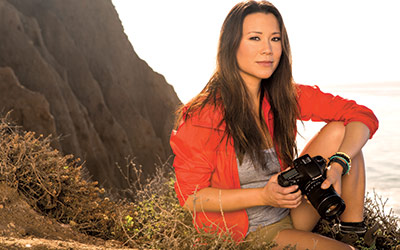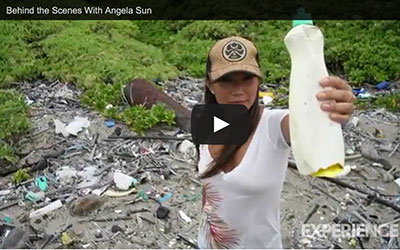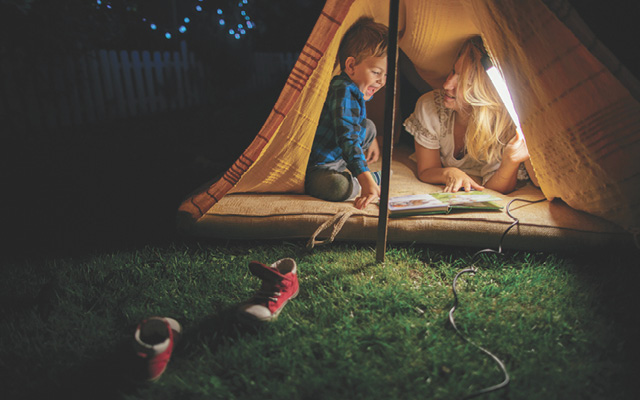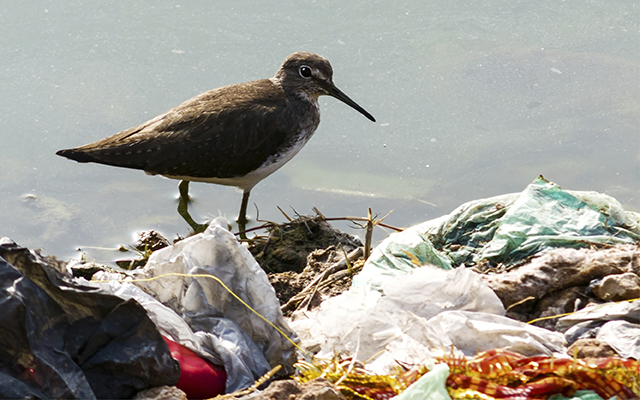Angela Sun has chased sharks and kissed stingrays. She’s worked as a sportscaster, actress, and investigative reporter. And she’s traveled to the ends of the earth in search of “untold stories” to share with the world.
Her latest project is an eight-year labor of love. Titled Plastic Paradise: The Great Pacific Garbage Patch, the documentary film focuses on an area of the ocean where — thanks to the combined effects of natural currents and mankind’s consumption habits — debris collects in a vortex of trash.
“People underestimate how much water there really is on this planet, and how much trash we produce. Our landfills obviously do not hold all of it,” Sun says. “When I first heard about the garbage patch, I had to know more.”
The project has dominated Sun’s waking life — and interrupted much of her sleep — for the better part of a decade. The California native credits regular workouts, including running, yoga, and her favorite sport of surfing, with keeping her mind and body balanced.
“Travel, also, really resets me,” says Sun, whose wanderings have led her to more than 40 countries, including China and Australia, and who speaks Mandarin, Spanish, and some German. “Removing myself physically from my surroundings, even for a short time, actually makes me appreciate home a lot.”
Experience Life | “Travel” and “adventure” seem to be two words that summarize your life. Have you always been an explorer?
Angela Sun | A turning point in my life was when I lost my dad to cancer when I was 17. Up to that point, I had never really desired to go and traverse the world, just because I didn’t know anything else. But seeing my dad, an immigrant from China, pass away when he was 57, seeing how much hard work he put into coming to this new country for his family and then not being able to enjoy it — that led me to really challenge myself to live in the moment. I try to live life fully with no regret.
EL | How were you able to launch your career at such a young age?
AS | My first big adventure was a mission trip to China, which I took with my church group at 19. It really opened my eyes to how people in other parts of the world live. That led to studying abroad for one year in Australia, taking time to travel to Southeast Asia and New Zealand. I traveled with friends; I traveled alone. Knowing your threshold for being alone is such an experience. That was really an amazing time of growth.
EL | How did this wanderlust of yours lead to journalism?
AS | I knew what I wanted to do in terms of my career when I was 13. I wrote a goals list that included things like go to Australia, swim with sharks, be in a movie, be part of a TV show, learn to surf — be a journalist. Actually, I was thinking red-carpet interviews for entertainment news, but once I started traveling, it opened up a whole new world and a whole new side of telling stories. My passion for good storytelling is what drives me.
EL | It sounds like you’ve been able to check off many of the items on your goals list.
AS | Yes, it’s crazy. I’ve always been focused. I’ve always thought a couple of steps ahead.
EL | Plastic Paradise is your first feature-length documentary. What about this story inspired you to shift gears to documentary filmmaking?
AS | Coming from the background of a surfer and scuba diver, and as someone who has always loved the oceans and grown up around them, I am very passionate about protecting my backyard and protecting where I play. The topic was near and dear to me.
EL | You say that roughly 85 percent of the debris in the Pacific garbage patch is nonbiodegradable plastic material. How has working on this film changed how you relate to plastic?
AS | Every day, almost every single person on the planet encounters plastic in one way, shape, or form, be it in what you’re wearing, what you’re touching, what you have in your purse, what you’re sitting on. It’s pretty much inescapable. It’s easy to just be really fatalistic, to give up and throw your hands in the air. But there are baby steps. I use reusable bottles and reusable bags. I keep a to-go kit in the car for when I eat out. I don’t shop online because there is a lot of plastic in the packaging. It’s a lot of just thinking ahead, which is hard because we like convenience. But we are paying for that convenience in a lot of different ways.
EL | What would you say to someone who wants to travel — who craves adventure — but can’t afford the time or money?
AS | You don’t have to go to a far, far place to find adventure. You create your own opportunities. There are couch-surfing websites, fellowships, grants. Whatever you want to do in life, you can. And travel, which doesn’t have to be lavish, is well worth the effort. You come home, and things look different. Getting outside your comfort zone helps you appreciate what you have.
EL | Is there a dream destination that you haven’t yet visited?
AS | Papua New Guinea. It is one of the last frontiers, and I would love to explore it, meet with tribesmen, surf. In a world where we’re so digitally connected to everybody, Papua is a place that is still untouched.
Learn more about Plastic Paradise: The Great Pacific Garbage Patch at www.plasticparadisemovie.com.
Find more travel tips and adventure ideas in Experience Life’s Head Out archives at ExperienceLife.com/department/head-out.




This Post Has 0 Comments